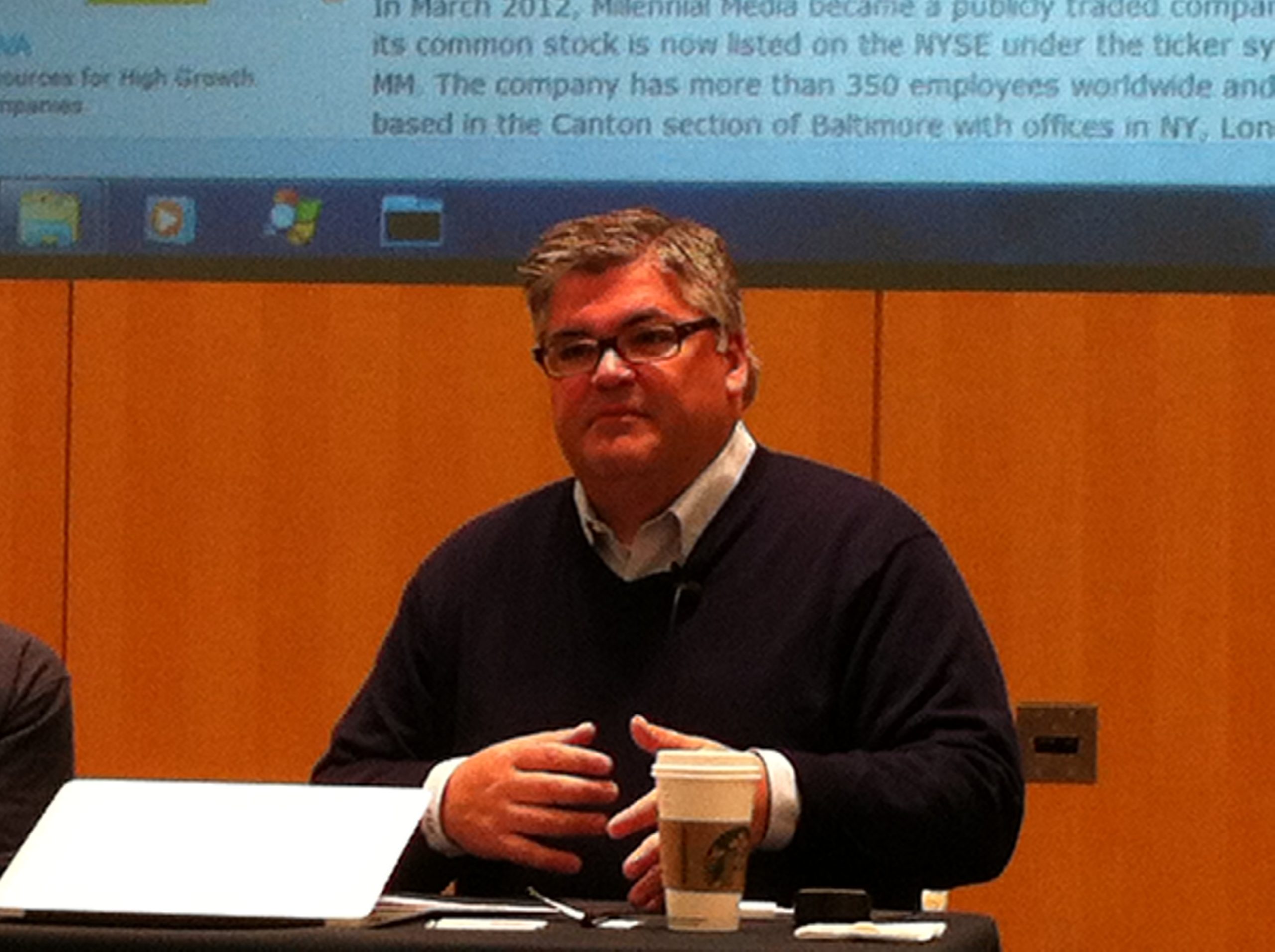Paul Palmieri loves Baltimore. A native of New Jersey, Palmieri has had wild success in his adopted hometown as the CEO and cofounder of Millennial Media, the global mobile advertising firm headquarted in Canton and second only to Google in its ownership of the mobile ad market.
He took his company public in March 2012, and despite several rough quarters immediately following the IPO, Millennial now employs north of 380 employees, is poised for growth and has committed itself to Charm City.
But Baltimore, Palmieri believes, is a divided town. It’s racially divided, geographically divided—even divided between designers and engineers within the tech community, he said during the second Exec TechBreakfast on Monday morning. The one division startup founders should use to their advantage, however, is the rift between Old and New Baltimore.
“Don’t spend time with people who are ‘Old Baltimore,’ ” Palmieri said. “Because it’s a recipe for failure. [A] complete ignoring of infrastructure here is the road to success.”
To which we say: these damn kids and their rock music.
Palmieri admonished Old Baltimore—those people who have been here “since the Mayflower,” he said—for its “insular mentality” and inward focus. It’s a community, he said, that are “only focused on this city, and have very little success outside of it.”
It’s a delicate criticism, one that’s difficult to stomach for people who contend that Baltimore can be—or already is—a world-class city, or at least one deserving of as much attention as Washington, D.C. Of course, that’s the crux of Palmieri’s candid critique: to be world-class, you have to be willing to not only compete against the world, but also punch back when they look down on you.
Yeah, we know Baltimore is more than “The Wire.” But holding a bunch of events where we assure the same 50 people we’re more than “The Wire” doesn’t do much to advance our cause.
And for startups in Baltimore to be successful, they have to be willing to look outside Baltimore for funding and opportunities.
That said, Palmieri’s convinced Baltimore has three main assets that can make startups here competitive with those in Silicon Valley:
- A pool of tech talent: tech-savvy developers are in this city, but they don’t like taking risks. It’s the job of private companies to lure them away from the guaranteed work and hefty salaries the defense industry promises. Millennial itself has spent “millions of dollars in recruiting costs,” Palmieri said, to pull people from defense jobs.
- A pool of design talent: Palmieri’s comment about a designer-engineer divide notwithstanding, Baltimore can lay claim to a designer-rich community, one that’s more impressive than the ones in D.C. and northern Virginia, in his eyes.
- A supportive state and city: Mayor Stephanie Rawlings-Blake “is all over this stuff,” Palmieri said. He didn’t elaborate much beyond that, but the state resources are clearly there—the Maryland Venture Fund, InvestMaryland and TEDCO all pump funding into early-stage companies.
As for what Baltimore needs?
“The city is missing a major conference center that is not a convention center,” he said. Baltimore needs something like the Bell Harbor International Conference Center in Seattle. It’s meeting space, a location where a major developers conference could take place, as opposed to just an expansive indoor facility.
Join our growing Slack community
Join 5,000 tech professionals and entrepreneurs in our community Slack today!
Donate to the Journalism Fund
Your support powers our independent journalism. Unlike most business-media outlets, we don’t have a paywall. Instead, we count on your personal and organizational contributions.

Maryland firms score $5M to manufacture everything from soup to nanofiber

National AI safety group and CHIPS for America at risk with latest Trump administration firings

How women can succeed in male-dominated trades like robotics, according to one worker who’s done it


